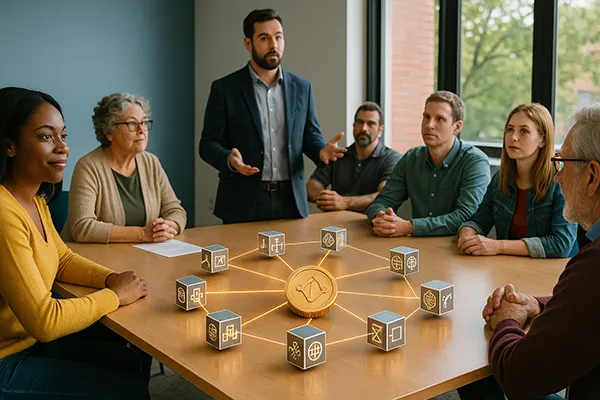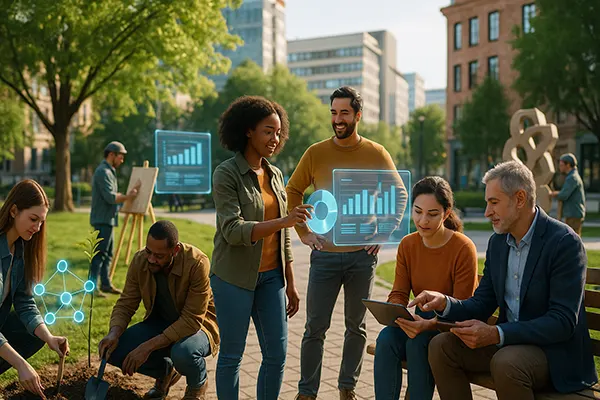
Crypto-DAOs as Tools for Civic Engagement: Governance and Local Initiative Funding
In recent years, decentralised autonomous organisations (DAOs) have gained significant traction beyond the cryptocurrency community. They are now being discussed as potential instruments for civic engagement, enabling citizens to collaborate transparently, fund projects, and influence decision-making without relying on traditional hierarchical structures. As municipalities and grassroots groups explore new ways to strengthen community participation, DAOs provide a framework that combines blockchain transparency with democratic governance.
DAO Governance in Civic Participation
The governance model of DAOs relies on blockchain-based voting systems, where participants use tokens or digital identities to cast votes on proposals. This mechanism ensures that decision-making is both transparent and tamper-proof, addressing long-standing issues of trust in public administration. In 2025, several European cities, including Barcelona and Tallinn, are piloting DAO-inspired models to enable residents to directly influence budget allocations and urban planning initiatives.
Such governance structures allow citizens to become active participants in shaping local policies rather than passive observers. For example, community-driven DAOs can establish rules regarding sustainability projects, social initiatives, or neighbourhood infrastructure improvements. Smart contracts automatically enforce outcomes once a proposal reaches consensus, eliminating the possibility of bureaucratic delays or mismanagement.
Furthermore, DAOs encourage inclusivity by lowering barriers to participation. Residents with internet access can contribute to discussions and decision-making, regardless of their background. This shift towards decentralisation challenges traditional political systems but also complements them by creating new channels for collaboration between local governments and citizens.
Challenges of DAO Governance
Despite their potential, DAO governance faces challenges in the civic sphere. One major issue is voter apathy, which can lead to low participation rates and concentrated decision-making power among active minorities. Additionally, the complexity of blockchain technology may discourage less tech-savvy individuals, raising concerns about equal access and representation.
Legal frameworks also lag behind technological developments. While some jurisdictions are beginning to recognise DAOs as legal entities, the majority still operate in a grey area. This uncertainty may limit their adoption for civic purposes until clearer regulations are established. Governments need to strike a balance between innovation and accountability, ensuring that DAO governance aligns with democratic principles and existing laws.
Lastly, the question of cybersecurity cannot be ignored. DAO smart contracts are susceptible to vulnerabilities that, if exploited, could undermine trust in the system. Ongoing investment in secure code auditing, decentralised identity solutions, and citizen education is essential to safeguard governance processes.
Funding Local Initiatives Through DAOs
One of the most promising applications of DAOs is community-based funding. Instead of relying solely on municipal budgets, local initiatives can raise capital through decentralised crowdfunding campaigns managed on blockchain. This method enables transparency in how funds are allocated and spent, offering reassurance to donors and participants alike.
In practice, a DAO can create a treasury funded by contributions from citizens, NGOs, or private investors. Members then vote on how to allocate resources—be it for park renovations, cultural events, renewable energy projects, or social welfare programmes. This direct involvement empowers communities to prioritise projects that matter most to them without lengthy political processes.
Several pilot projects in 2024 and 2025 demonstrated the effectiveness of DAO-based funding. In Switzerland, a community DAO successfully financed a solar panel initiative across public schools, while in South Korea, a DAO funded local art festivals through transparent budgeting and collective decision-making. These real-world cases highlight how DAOs can bridge the gap between citizen aspirations and resource allocation.
Barriers to DAO-Based Funding
However, DAO-driven funding mechanisms must overcome certain barriers to scale effectively. Currency volatility remains a significant challenge, as most DAO treasuries still rely on cryptocurrencies subject to rapid fluctuations. Stablecoins and tokenised fiat currencies offer potential solutions, but they require robust regulatory acceptance to ensure financial stability.
Another concern is ensuring equitable contribution and benefit. Wealthier individuals may have disproportionate influence if voting power is tied directly to token holdings. To counteract this, quadratic voting and identity-based governance models are being tested to ensure fairness in decision-making. These approaches aim to balance influence while maintaining the transparency that blockchain provides.
Finally, financial literacy plays a crucial role. For DAO-based funding to succeed in civic contexts, communities must understand not only how to contribute but also how to evaluate proposals critically. Training programmes and partnerships with educational institutions are becoming increasingly important to build this capacity.

The Future of DAO-Driven Civic Engagement
As we move deeper into 2025, the integration of DAOs into civic life is still in its experimental stage, yet momentum is growing. Cities are recognising the potential of blockchain governance to improve transparency, reduce corruption, and foster stronger community bonds. With technological improvements and regulatory clarity, DAOs could become a standard tool for participatory democracy.
Emerging innovations such as decentralised identity verification, zero-knowledge proofs, and interoperability between different blockchain networks are paving the way for more secure and accessible DAOs. These technologies address current limitations and make DAOs a viable option for municipalities seeking to engage citizens in meaningful ways.
Ultimately, the future of DAO-driven civic engagement depends on the willingness of governments, communities, and technologists to collaborate. By focusing on inclusivity, security, and transparency, DAOs have the potential to transform civic participation into a more democratic, efficient, and citizen-focused process.
Key Considerations for the Coming Years
Looking ahead, several considerations will determine the long-term success of DAO integration in civic contexts. Firstly, governments must establish clear regulatory frameworks that legitimise DAOs without stifling innovation. Secondly, communities need access to educational resources that empower citizens to engage effectively with blockchain-based governance. Thirdly, partnerships between public institutions and technology providers will be crucial in scaling solutions across different regions.
At the same time, it is vital to maintain the core democratic principles of fairness, accountability, and inclusivity. While DAOs offer technological efficiency, they should enhance—not replace—traditional forms of democratic governance. Hybrid models, where DAOs complement municipal councils or citizen assemblies, may offer the most practical path forward.
In conclusion, DAOs represent a new chapter in civic participation. If designed thoughtfully and implemented responsibly, they can serve as powerful instruments for community empowerment and local development in the years to come.
Popular articles
-
 How to Check a Crypto Wallet Before Your First Transaction: Setup, ...
How to Check a Crypto Wallet Before Your First Transaction: Setup, ...Sending your first cryptocurrency transaction is not simply a matter …
-
 Is Real Decentralisation Still Possible? A 2026 Analysis of Nodes a...
Is Real Decentralisation Still Possible? A 2026 Analysis of Nodes a...“Decentralised” is one of the most used words in crypto, …
